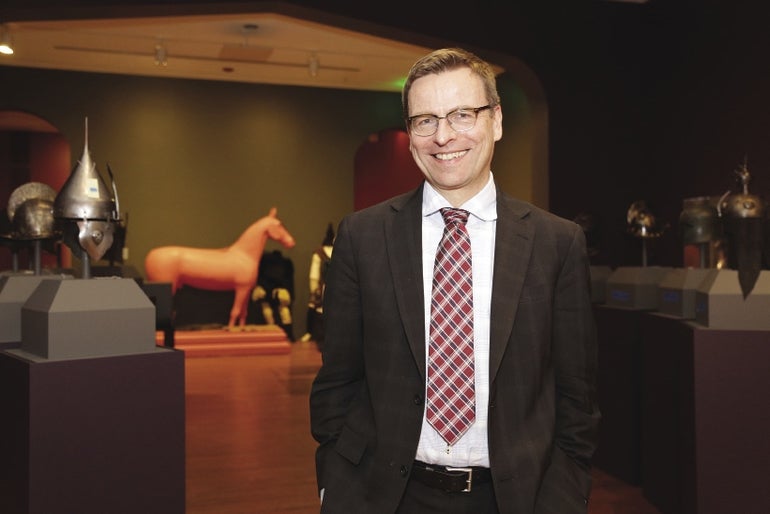
Not long after he took over as executive director of the Worcester Art Museum in 2011, Matthias Waschek was asked about art as both a cultural cornerstone and a business. His answer revealed an insight into part of his mission at his new job: Bring more people through the doors.
After all, the museum had — in the words of the German native — a phenomenal collection. So now that it had built this inventory of art … would the people come?
Waschek’s bosses — the museum’s board of directors — didn’t have to wait that long to get their answer. In the two calendar years since he took over for longtime director James Welu, the museum, under Waschek’s leadership, brought more people through the doors. In 2011, about 51,000 visited the museum, according to its 2013 annual report. Two years later, there were more than 74,000 visitors. A key to that was the museum’s decision to offer free admission during the months of July and August in 2012. That resulted in a 62-percent jump in free attendance. So, they did it again in 2013; free attendance jumped another 5 percent.
But the word of mouth from those who got in for gratis paid off more handsomely last year in paid attendance, which jumped 23 percent from 2012 to 2013.
The museum is also in a stronger position financially. Its asset base increased 7 percent from 2012 to 2013, while its liabilities fell about 4.5 percent.
Part of the museum’s gain in assets came from pledges following last year’s announcement that it would take in the collection from the Higgins Armory Museum after the 83-year-old Barber Avenue attraction closed at the end of last year. (Part of that collection opened to the public at the art museum this past weekend.)
Scaling that “steep mountain,” as Waschek called it, required a lot of thought that had begun before he came aboard, and painstaking planning. Yet for an undertaking that he said should ideally take two to three years, with planning, fundraising and integration, it was accomplished in just one by an understaffed institution, he noted.
The conversations about moving the Higgins collection to the art museum had actually begun in the 1970s, Waschek said. The Higgins didn’t have a large enough endowment and the building could not be operated efficiently — for example, with the right climate controls — for a collection of its kind.
Fast-forward to 2011, days before Waschek started his new job: After a meeting with officials at both sites, he came away with the thought that integrating the Higgins collection would complement the art museum’s mission. One key, he said, was children and how they could discover what else the art museum has to offer beyond the armor. “The Higgins (had) done a fantastic job to attract children. Our job has not been as fantastic as that,” Waschek said. So, at that point, adopting the Higgins collection became an obvious solution.
The support of both institutions’ boards, as well as financial backing from the community at large, also helped, he said.
‘Wonderful openness’
Waschek also wins high marks outside the museum. His counterpart at EcoTarium, Joseph Cox, said he and Waschek developed a “great working relationship” collaborating on programming and marketing. He has “a wonderful openness to him” with an approach that says “Let’s make something happen,” Cox said. “We’re all trying to work really hard to make Worcester a better place.”
Downtown, Troy Siebels, executive director at the Hanover Theatre for the Performing Arts, is also complimentary, calling Waschek a very dynamic leader who’s not afraid to make big changes.
“You don’t intuitively think of big change associated with an art museum,” Siebels said. “He has a clear vision in his head.”
Now in his third year at the art museum, Waschek has picked some of what he calls the “low-hanging fruit” among his goals, which is to drive more foot traffic and generate more revenue to help put the museum on more solid financial footing. “We have a huge momentum locally, but also regionally and nationally,” he said, some of that due in part to national media exposure.
So, what’s next?
Down the road, Waschek said, “institutions like ours should be free or as free as possible.” But to get to that point, after boosting interest and stabilizing finances, the museum needs to have a robust exhibition schedule, he noted. That requires building up the curatorial team to the proper level and raising enough money to support exhibitions. The museum is not there yet, Waschek said.
Then, there’s the external mission of aligning the museum’s mission with the city’s strategic plan of boosting the downtown area. That, too, requires Waschek to ensure that things are stabilized internally first, especially with the integration of the Higgins collection.
“Before we can think beyond our walls, we need to get our house in order,” he said. Then, he believes, things can happen faster.
Video
Business Leaders of the Year 2014 – Matthias Waschek, Worcester Art Museum
Read more

